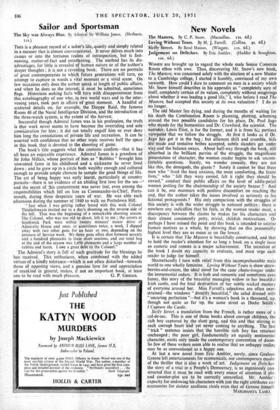Sailor and Sportsman
The Sky was Always Blue. By Admiral James. (Methuen.
2 t S.) - •
Tins is a pleasant record of a sailer's life,.quietly and simply related in a manner that is almost conversational. It never delves much into causes or into the tortuous realms of introspection, but is fast- moving, matter-of-fact and entertaining. The method has its dis- advantages, for little is revealed of human nature or of the-author's deeper thoughts ; it is not a revealing bOok: There are no portraits of great contemporaries to which_ future generatiqns- will turn, no attempt to capture in words a vital moment or a vivid scene. On few occasions only does the author speak at length of public affairs, and when he does so the interest; it must be admitted, sometimes flags. Historians seeking facts will turn With disappointment from this autobiography of one who, in two world wars and in the inter- vening years, took part in affairs of great moment. A handful of scattered details on, for example, the Dieppe Raid, the famous Room 40 of the Naval Intelligence Division, and the introduction of the three-watch system, is the extent of the harvest. Successful though Admiral James was in his profession, the truth is that work never seems to have become the overriding and sole • consideration for him ; it did not totally engulf him or ever deny him Long the consolations of private life and recreation. It can be asserted with confidence that no other topic receives half the space in this book that is devoted to the shooting of game.
The book's title suggests what the contents confirmthat it has- all been an enjoyable experience. Admiral James is a grandson of ; Sir John Millais, whose portrait of him as " Bubbles " brought him- unwonted fame in his childhood and a nicknaMe he never lived down ; and he grew up in a circle both wealthy enough and cultured enough to provide ample chances to sample the good things of life. The art of being happy was early learnt, particularly at country pursuits—there is no evidence of an abiding first love for the sea= and the Secret of this contentment was never lost, even among the responsibilities which fell on him as Commander-in-Chief, Ports- mouth, during three desperate years of war. He was able each afternoon during the summer of 1940 to walk on Portsdown Hill. " Just when I was getting rather bored, with this walk Colonel Thistlethwayte invited me to a day's shooting on -the reverse side of the hill. That was the beginning of a remarkable shooting season. The Colonel, who was too old to shoot, left it to me ; the covers at Southwick Park were within twenty minutes' motor drive of Admiralty Houk and once, or sometimes twice, a week, I slipped away with two other guns for an hour or two, depending on the_ pressure of Service work. We three guns often shot between seventy. and a hundred pheasants in theie short sessions, and our total bag at the end Of the season was 1,450 pheasants and a large number of rabbits and hares. I Owe a great debt4Othe Colonel." - The Admiral's story is full of such gratitude for the blessings he has, received. This enthusiasm, when combined with the added virtues-of -a kindly tolerance—which is not often disturbed—towards those ocf opposing views, and 'a genuine love for and appreciation of mankind in general, makes, if not an important book, at least one to be read with much-pleasure. G. P. GRIGGS.


































 Previous page
Previous page